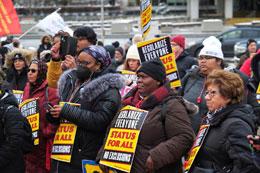Undocumented migrants suffering in limbo

By Isabel Inclan
New Canadian Media
Refugees, international students and caregivers rallied this week outside the federal government’s winter retreat in Hamilton, Ont. calling on Prime Minister Trudeau to fulfill his promise to regularize the undocumented migrants.
Organized by the Migrant Rights Network (MRN), demonstrators want a national immigration regularization program for the 500,000 undocumented migrants in Canada.
“Enough is enough. We do not want migrants to be detained or to die in immigration prisons,” said Byron Cruz, one of the rally organizers.
Advocates say that precarious immigration status leaves immigrants in vulnerable situations that can lead to labour exploitation or put their lives at risk. MRN highlights an unnamed, undocumented migrant who died in immigration custody in Surrey, B.C. on Christmas Day, as well as Fritznel Richard, who died in Quebec a few days later while crossing the border back to the U.S. after being unable to get a work permit in Canada.
“By allowing us permanent resident status, the cycle of job exploitation ends,” said Abu Hena Mostofa Kamal, an international student from Bangladesh who lost his status after paying close to $90,000 in tuition over three years to a Thunder Bay university.
“When we can’t pay the exorbitant tuition fees, we get punished,” stated Kamal, who is stuck in limbo with a working permit in one hand and a removal order in the other.
In an interview with New Canadian Media, the former computer science student who is now working in a restaurant said that the immigration system “is designed to keep us permanently temporary.
“The precarious immigration status keeps us in a limbo. It doesn’t let us unleash our full potential and we suffer from mental health, can’t get reunited with our family and it puts our lives on hold.”
According to the migrant rights group, at least 1.2 million people are in Canada on temporary work, study or refugee claimant permits. Those in low-paying jobs, in particular, have no access to permanent residency so eventually, they are forced to either leave or stay in the country undocumented. As a result, they say there are over 500,000 undocumented people in the country.
Immigration Minister Sean Fraser announced recently the government is expanding a permanent residence pilot program for out-of-status construction workers in the Great Toronto Area.
“This will give 500 racialized, working-class people the power to protect themselves and be with their families,” said Syed Hussan, Executive Director of Migrant Workers Alliance for Change, and added, “we need a regularization program for the 499,500 undocumented migrants and their families, and 1.2 million migrants on a temporary status that are being shut out of equal rights.”
At their rally in Hamilton, migrants’ advocates called on Trudeau and federal cabinet ministers to fulfill their promise to regularize status for undocumented workers, as stated in the December 2021’s mandate letter to the Immigration minister.
“We will be outside the cabinet retreat chanting and doing speeches with signs. We have let the Prime Minister and Immigration Minister’s offices know that we will be there,” Hussan told NCM.
He said the federal government “can grant permanent resident status to half a million undocumented people and their families through an uncapped program without any exclusions.”
In their proposal for regularization, MRN calls for a “first-stage processing of work permits that should be automatically renewed until the application is fully processed.” The ongoing federal pilot program for regularization requires a minimum of five years living in Canada; the MRN proposal asks for no more than two years.
In the last 14 years, Gloria Hernandez has worked as a cleaner and during the pandemic, she became an essential worker. She says she paid her taxes for 10 years and volunteered, but her permanent residency petition was refused twice.
“During the pandemic, with the cleaners’ shortage, my employer begged me to go clean other areas because there was no staff. I worked all day from Sunday to Sunday earning $15 an hour,” recalled Hernandez while packing.
After a long immigration process requesting to stay for humanitarian reasons, which cost her around $9,000, Hernandez said she got tired and decided to give up her efforts to stay in Canada.
“It was very stressful and exhausting,” she said. “I started to get depressed during the pandemic. I no longer want to spend much money on my process. I already sold my things, cancelled my bank accounts, and internet and I will return to Mexico soon.”
Hernandez is one of the thousands of immigrants with precarious status working as cleaners. At present, there is no pilot immigration program for this sector.
Another irregular migrant, who asked not to be identified because of her immigration process, said she has worked since 2020 as a live-in caregiver, nanny and now a cleaner. She lost her status during that time and now is eager to regularize and continue working to support her 11-year-old daughter.
“Cleanliness is part of health. If there is no clean hospital, infections spread. We do jobs that Canadians don’t do. We are necessary,” she said.
Because of her precarious migration status, she said she has suffered labour exploitation, being paid $4 an hour to take care of an elderly woman, and $12 to care for two children.
“We are all necessary both in construction and in cleaning,” Hernandez said. “Canada needs us. The government should create more pilot programs that include cleaning workers. We want status for all without exclusion and without so many requirements.”
The COVID pandemic showed how essential cleaner workers are, she said.
“Canada should take advantage of us who have worked for many years and already know Canadian culture and behave like Canadians,” Hernandez said. “I did not commit any fault; I did not commit any crime. I always worked, but they didn’t let me stay.”









